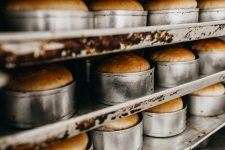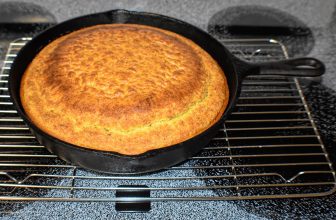Baking is not just a culinary art form, but a delightful experience that brings people together through the sheer pleasure of homemade treats. Whether you are an experienced baker or just starting out, having the right bakeware is crucial for achieving excellent results. The right bakeware can make a significant difference in the texture, appearance, and overall success of your baked goods. In this article, we will explore the world of bakeware essentials, from choosing the right materials to understanding different types of bakeware and exploring essential tools and accessories. We will also provide tips and tricks for successful baking and recommend top brands and products to enhance your baking experience. So, get ready to bake with the best bakeware and take your culinary creations to new heights!
1. Introduction to Bakeware Essentials
1.1 The Importance of Quality Bakeware
Baking is not just about the ingredients and the recipe; it’s also about the tools you use. Quality bakeware can make a world of difference in your baking adventures. Imagine trying to bake a perfect cake with a warped pan or struggling to remove cookies from a flimsy baking sheet. Investing in good bakeware ensures even heat distribution, durability, and ease of use, making your baking experience a whole lot sweeter.
1.2 Understanding the Role of Bakeware in Baking
Bakeware plays a crucial role in achieving baking success. Different types of bakeware materials conduct heat differently, which affects the texture and browning of your baked goods. Additionally, the shape and size of your bakeware can impact cooking times and evenness. Understanding how bakeware functions will empower you to make informed choices when it comes to selecting the right tools for your baking endeavors.
2. Choosing the Right Material for Bakeware
2.1 Exploring Different Bakeware Materials
When it comes to bakeware, there are a variety of materials to choose from, each with its own set of advantages and disadvantages. Popular options include stainless steel, aluminum, non-stick, silicone, and glass bakeware. Each material has distinct properties that affect heat conduction, durability, and non-stick properties, so it’s important to consider your baking needs and preferences before making a choice.
2.2 Pros and Cons of Different Bakeware Materials
Stainless steel bakeware is durable and distributes heat evenly, but it may require greasing or lining for non-stick purposes. Aluminum bakeware heats up quickly and promotes even browning but may react with certain acidic ingredients. Non-stick bakeware is convenient for easy release and cleaning but can wear out over time. Silicone bakeware is flexible and non-stick, but may require additional support for stability. Glass bakeware provides excellent heat distribution but requires caution when it comes to temperature changes. Understanding the pros and cons of each material will help you make an informed decision that suits your baking needs.
3. Exploring Different Types of Bakeware
3.1 Baking Pans and Sheets
Baking pans and sheets are essential for creating a variety of baked goods, from cookies and brownies to sheet cakes and bread. Choose from different sizes and shapes to accommodate your baking projects and ensure even heat distribution for consistent results.
3.2 Muffin and Cupcake Pans
Muffin and cupcake pans are a must-have for any baking enthusiast. These pans come in various sizes and designs, allowing you to whip up perfectly portioned treats that are sure to impress. Look for non-stick options for easy release and cleanup.
3.3 Cake Pans
Cake pans come in round, square, and rectangular shapes, enabling you to create stunning layer cakes and specialty desserts. Opt for pans with straight sides for easy layering and even baking. Non-stick pans can be a game-changer when it comes to cake removal.
3.4 Pie and Tart Pans
Pie and tart pans are essential for achieving flaky, golden crusts. Whether you prefer classic round pie pans or intricate tart pans with removable bottoms, having the right pan ensures your pies and tarts turn out beautifully.
3.5 Specialty Bakeware
Specialty bakeware includes bundt pans, loaf pans, springform pans, and more. These pans are designed for specific baked creations like bundt cakes, quick breads, cheesecakes, and quiches. Adding a few specialty pans to your collection can open up a world of baking possibilities.
4. Essential Tools and Accessories for Baking
4.1 Measuring Tools
Accurate measurements are crucial for baking success, so investing in quality measuring tools is a must. Make sure to have measuring cups, spoons, and a kitchen scale to ensure precise measurements for your recipes.
4.2 Mixing Bowls and Utensils
Mixing bowls and utensils are your baking buddies. Opt for durable, heatproof mixing bowls in various sizes for easy mixing, whisking, and folding. Don’t forget to have a sturdy spatula, whisk, and wooden spoon on hand to assist you in your baking endeavors.
4.3 Oven Thermometer
Ever wondered if your oven is telling you the truth about its temperature? An oven thermometer can help you ensure that your baking temperature is accurate, allowing for consistent and reliable results.
4.4 Baking Mats and Liners
Baking mats and liners are game-changers when it comes to easy cleanup and non-stick baking. Silicone baking mats and parchment paper liners provide a non-stick surface, making the removal of baked goods a breeze. These handy tools also protect your bakeware from stains and scratches.
Now that you’re equipped with the knowledge of bakeware essentials, it’s time to unleash your baking prowess and create delectable treats that will have everyone asking for seconds. Happy baking!
5. Proper Care and Maintenance of Bakeware
Taking care of your bakeware is essential to ensure it lasts for many baking adventures to come. Here are some tips on how to keep your bakeware in tip-top shape.
5.1 Cleaning Tips for Different Bakeware Materials
Cleaning bakeware doesn’t have to be a dreaded chore. Here’s a quick rundown on how to clean different types of bakeware materials:
– Non-Stick: Use a gentle dishwashing soap and a soft sponge or cloth to clean non-stick bakeware. Avoid using abrasive cleaners or scrubbers that can damage the non-stick coating.
– Stainless Steel: Stainless steel bakeware is dishwasher safe, but for best results, handwashing with warm soapy water is recommended. Stubborn stains or burnt-on food can usually be removed with a baking soda and water paste.
– Glass: Glass bakeware is dishwasher safe, but avoid sudden temperature changes, as it can cause the dish to shatter. Handwashing with warm soapy water is a safe bet.
– Silicone: Silicone bakeware is a breeze to clean! Simply pop it in the dishwasher or wash it by hand with soapy water. It’s also naturally non-stick, so you won’t need to worry about sticking.
5.2 Storing Bakeware Properly
Proper storage not only keeps your bakeware organized but also helps extend its lifespan. Consider these storage tips:
– Stackable: Invest in stackable bakeware or use dividers to maximize space and prevent scratches or dents.
– Hanging: If you have limited cabinet space, consider hanging your bakeware from a pot rack or using adhesive hooks inside cabinet doors.
– Protect the Coating: For non-stick bakeware, place a layer of parchment paper or a soft cloth between each piece to prevent the non-stick coating from getting scratched.
6. Tips and Tricks for Successful Baking
Baking is equal parts science and art. Here are some tips and tricks to help you achieve baking greatness in your kitchen.
6.1 Preheating the Oven and Proper Temperature Control
Preheating the oven is crucial for consistent baking results. Make sure to preheat your oven for the specified time to ensure your baked goods rise and cook evenly. And don’t forget to use an oven thermometer to ensure your oven is at the correct temperature.
6.2 Understanding Baking Times and Adjustments
Baking times can vary depending on your oven, altitude, and even the size of your baking pan. Keep an eye on your baked goods and use the recommended baking time as a guideline. If your baked goods are browning too quickly, you can tent them with foil to prevent burning.
6.3 Using Parchment Paper and Non-Stick Techniques
Parchment paper is a baker’s best friend. It not only prevents sticking but also makes cleanup a breeze. Use it to line your baking pans and you’ll never have to worry about prying your cookies off the sheet again. Additionally, you can use non-stick cooking spray or grease your pans with butter or oil to ensure easy release.
6.4 Dealing with Sticking and Overcooked Baked Goods
Sometimes, despite our best efforts, baked goods still stick or come out overcooked. Don’t fret! If your baked goods stick, gently loosen them with a spatula or try placing the pan in hot water for a few minutes to soften any stuck-on bits. For overcooked items, try soaking them in a simple syrup or glaze to add moisture and revive their texture.
7. Conclusion: Elevate Your Baking Experience with Quality Bakeware
Investing in quality bakeware is the secret ingredient to taking your baking to new heights. With proper care, useful tips and tricks, and the right brands at your side, you’ll be well-equipped to create mouthwatering masterpieces in the kitchen. So, get ready to bake your heart out and let your creativity soar with the best bakeware!
In conclusion, investing in high-quality bakeware is a game-changer for anyone passionate about baking. By understanding the importance of bakeware materials, exploring different types of bakeware, and equipping yourself with essential tools and accessories, you can elevate your baking skills to the next level. Remember to properly care for and maintain your bakeware to ensure its longevity and optimal performance. With the right bakeware in hand, coupled with the tips and tricks shared in this article, you can embark on a delightful baking journey and create mouthwatering treats that will impress family and friends. So, get ready to bake with confidence and enjoy the sweet rewards of your labor!






